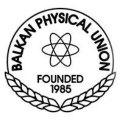Speaker
Description
To achieve a good determination of the equivalent dose for occupational exposure workers from the whole body dosimeter an overall uncertainty associated with the measurement needs to be estimated. The work reported here is focused to estimate the absolute standard uncertainty that arises for Reader Calibration Factor (RFC), Element Correction Coefficient (ECC), and Zero Dose Reading. In this study, the thermoluminescence dosimeters are used and measured with Harshaw4500 Reader at Personal Dosimetry Laboratory in the Institute of Applied Nuclear Physics, Tirana, Albania and irradiated in the Secondary Standard Dosimetry Laboratory (SSDL) in place. In this study we estimated the uncertainties coming from the measurements, and didn’t take into consideration those which might arise from the users. The method used in this study is based on Guide to the Expression of Uncertainty in Measurement and ISO TR 62461 standard. The absolute standard uncertainty estimation for the RCF is found to be 0.0013nC/µSv, for the ECC is 0.028 and the Zero Dose Reading is 0.1324nC. This study will be expanded to include other important sources of uncertainties that influence the measurement, such as linearity correction factor, energy and angular correction factor, fading factor, temperature, environmental conditions, etc., in order to estimate the overall uncertainty that arises from all these sources and to find which of the input quantities have the largest contribution on it.

